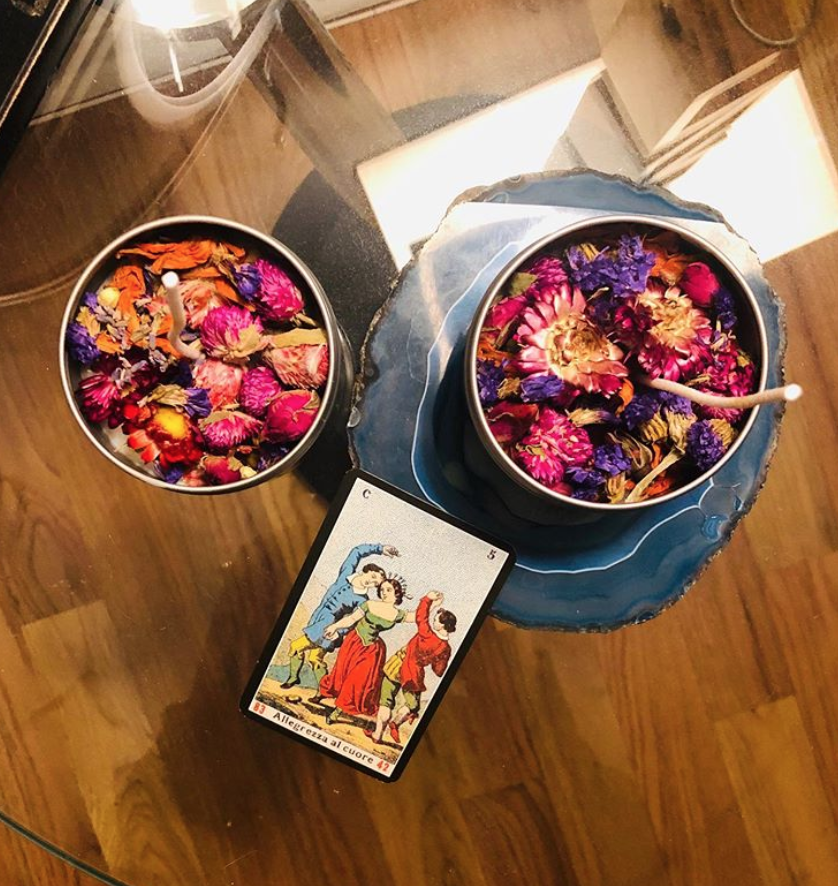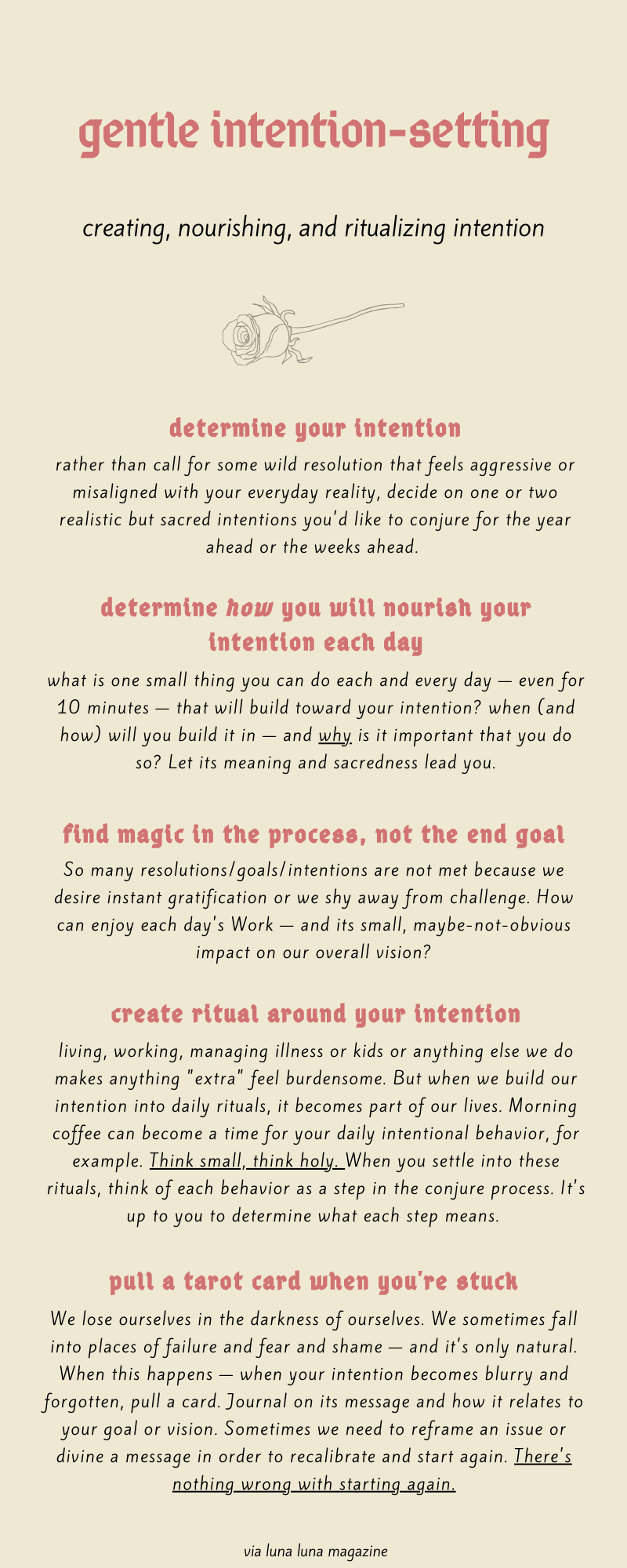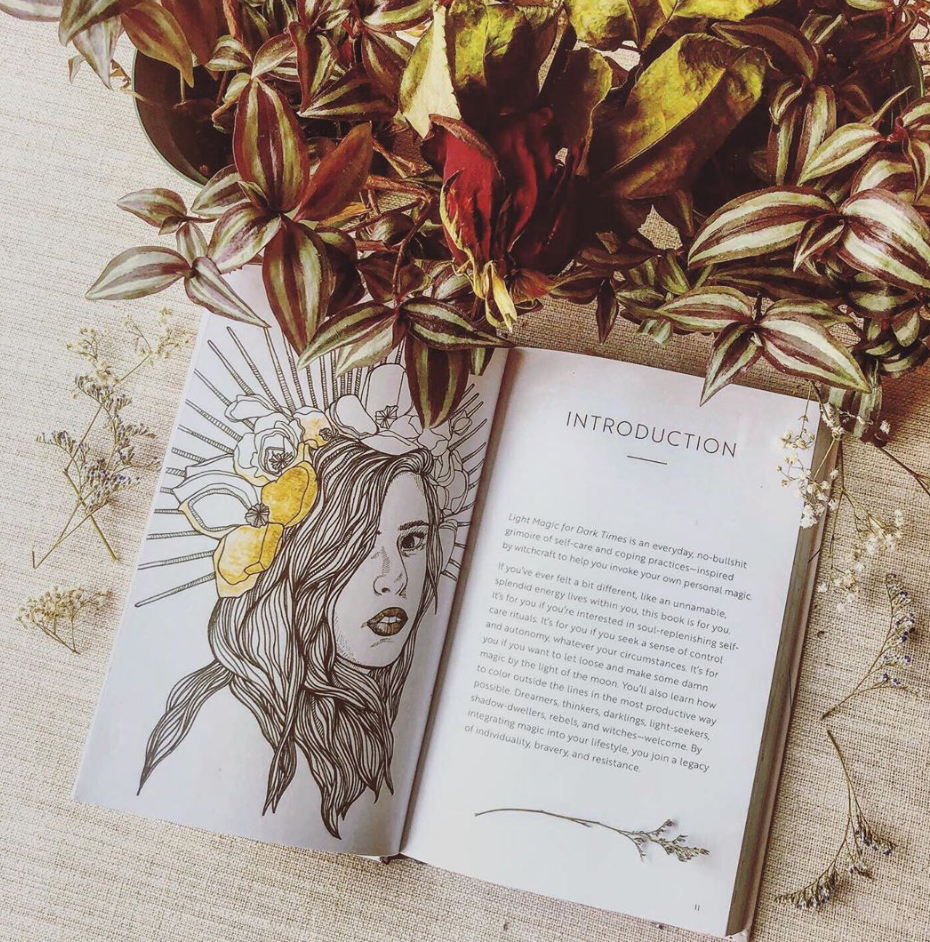How can we tap into our creative energies when we are battling chronic fatigue, chronic pain, inflammatory issues, brain fog, & the mental health issues that come from managing illness?
Read Moreautumn beloveds day 5: DIY Candle Making Kit
A candle, to me, is a simple but effective way of lighting the path and of signaling goodness and safety. Of course, you can program these candles with your intention and energy, design them with sigils and symbols, use color magic as you apply the flowers — making them even potent in an incredible way.
Read MoreHere Are Some Writing Prompts Inspired by Botanical Gardens
BY MONIQUE QUINTANA
In any season, the garden as space is a constant source of creative inspiration. Some gardens are rocky and monochromatic, some subdued, and some bright. In each garden is a cyclic narrative, containers of our vast memories and dreamscapes. Here are a few writing prompts inspired by botanical things.
Agave
Write a revelation that happens in the time it takes the character to sew a tiny garment.
Blue Hibiscus
Write about a quarreling household that is preparing for an unprecedented season of frost. How do they find a moment of peace and grace?
Manzanita
Write a character that discovers a strange shape when they cut open a piece of fruit.
Wormwood
Write a trail of childhood objects on a rocky footpath for a beloved to find.
Mugwort
Write about a talisman that has protected your character’s family from a particular creature. What happens when the talisman doesn’t work for your character?
Summer Snapdragon
Write a character that notices a drastic and mysterious change in the landscape outside their window. What do they learn from the mystery?
Monique Quintana is a contributor at Luna Luna Magazine and her novella, Cenote City, was released from Clash Books in 2019. Her short works has been nominated for Best of the Net, Best Microfiction, and the Pushcart Prize. She has been awarded artist residencies to Yaddo, The Mineral School, and Sundress Academy of the Arts. She has also received fellowships to the Squaw Valley Community of Writers, the Open Mouth Poetry Retreat, and she was the inaugural winner of Amplify’s Megaphone Fellowship for a Writer of Color. She blogs about Latinx Literature at her site, Blood Moon and lives in the sleepy little town of Fresno, CA. You can find her at moniquequintana.com
Make Your WFH Status Absolutely Magical
Stephanie Valente lives in Brooklyn, NY. She is a Young Adult novelist, short fiction writer, poet, editor, content & social media strategist. In short, she wears many hats. Especially if they have feathers. She is the Assistant Editor at Yes, Poetry and a writer at Luna Luna Magazine. Some of her writing has appeared in Bust Magazine, Electric Cereal, Prick of the Spindle, The 22 Magazine, Danse Macabre, Uphook Press, Literary Orphans, Nano Fiction, and more. She has provided content strategy, copy, blogging, editing, & social media for per’fekt cosmetics, Anna Sui, Agent Provocateur, Patricia Field, Hue, Montagne Jeunesse, Bust Magazine, Kensie, Web100, Oasap, Quiz, Popsugar, among others.
Read MoreSetting, Nourishing, And Ritualizing Intentions That Stick
BY LISA MARIE BASILE
I’ve always responded poorly to “resolutions.” To me, change is always best when it’s gradual and backed up by deep emotional reasoning rather than, “well, it’s a new year. I better overhaul something.” Also, I’m a rebel and a known self-sabotager, so if you’re like me, that approach probably feels too authoritarian and unnatural.
So I decided instead to set several small intentions — all of which will add to a vision. They’re not hard or fast or misaligned with my ethics or values; rather, they’re small ideas that I can add to my each and every day.
My intentions for this year is to spend at least a portion of each day on stress management or self-care (this is naturally open-ended) and to recalibrate my health behaviors around food and alcohol (again, no hard or fast rules; rather, the intention is to be aware and to make changes). So, every day I ask myself: Why am I doing this? What is the emotional connection for me?
I did this because being a writer, editor, author, and freelancer is hard when I am managing a chronic illness and a relationship. I did this because in all of that I’ve lost myself a bit and, along the way, I lost a sense of healthfulness.
So, from me to you, here are the guidelines I keep in mind when setting and managing intentions.
What are your intentions for the year ahead? Below, a downloadable infographic to use and keep on your end.
determine your intention
rather than call for some wild resolution that feels aggressive or misaligned with your everyday reality, decide on one or two realistic but sacred intentions you'd like to conjure for the year ahead or the weeks ahead.
determine how you will nourish your intention each day
what is one small thing you can do each and every day — even for 10 minutes — that will build toward your intention? when (and how) will you build it in — and why is it important that you do so? Let its meaning and sacredness lead you.
find magic in the process, not the end goal
So many resolutions/goals/intentions are not met because we desire instant gratification or we shy away from the challenge. How can we enjoy each day's Work — and its small, maybe-not-obvious impact on our overall vision?
create ritual around your intention
living, working, managing illness or kids or anything else we do makes anything "extra" feel burdensome. But when we build our intention into daily rituals, it becomes part of our lives. Morning coffee can become a time for your daily intentional behavior, for example. Think small, think holy. When you settle into these rituals, think of each behavior as a step in the conjure process. It's up to you to determine what each step means.
pull a tarot card when you're stuck
We lose ourselves in the darkness of ourselves. We sometimes fall into places of failure and fear and shame — and it's only natural. When this happens — when your intention becomes blurry and forgotten, pull a card. Journal on its message and how it relates to your goal or vision. Sometimes we need to reframe an issue or divine a message in order to recalibrate and start again. There's nothing wrong with starting again.
5 Meaningful Gifts for the Magical Thinkers in your Life
Kailey Tedesco's books These Ghosts of Mine, Siamese (Dancing Girl Press) and She Used to be on a Milk Carton (April Gloaming Publications) are both forthcoming. She is the editor-in-chief of Rag Queen Periodical and a performing member of the Poetry Brothel. Her work has been nominated for the Pushcart. You can find her work in Bellevue Literary Review, Hello Giggles, UltraCulture, Poetry Quarterly, and more. For more, please visit kaileytedesco.com.
Read More
Weekly Mantras for Badass Witches
Stephanie Valente lives in Brooklyn, New York, and works as an editor. One day, she would like to be a silent film star. She is the author of Hotel Ghost (Bottlecap Press, 2015) and Waiting for the End of the World (Bottlecap Press, 2017). Her work has appeared in dotdotdash, Nano Fiction, LIES/ISLE, and Uphook Press. She can be found at her website.
Weekly Mantras for Badass Witches: Halloween Edition
Stephanie Valente lives in Brooklyn, New York, and works as an editor. One day, she would like to be a silent film star. She is the author of Hotel Ghost (Bottlecap Press, 2015) and Waiting for the End of the World (Bottlecap Press, 2017). Her work has appeared in dotdotdash, Nano Fiction, LIES/ISLE, and Uphook Press. She can be found at her website.
Read MoreWeekly Mantras for Badass Witches
Stephanie Valente lives in Brooklyn, New York, and works as an editor. One day, she would like to be a silent film star. She is the author of Hotel Ghost (Bottlecap Press, 2015) and Waiting for the End of the World (Bottlecap Press, 2017). Her work has appeared in dotdotdash, Nano Fiction, LIES/ISLE, and Uphook Press. She can be found at her website.
Weekly Mantras for Badass Witches
Stephanie Valente lives in Brooklyn, New York, and works as an editor. One day, she would like to be a silent film star. She is the author of Hotel Ghost (Bottlecap Press, 2015) and Waiting for the End of the World (Bottlecap Press, 2017). Her work has appeared in dotdotdash, Nano Fiction, LIES/ISLE, and Uphook Press. She can be found at her website.
Weekly Mantras for Badass Witches
Stephanie Valente lives in Brooklyn, New York, and works as an editor. One day, she would like to be a silent film star. She is the author of Hotel Ghost (Bottlecap Press, 2015) and Waiting for the End of the World (Bottlecap Press, 2017). Her work has appeared in dotdotdash, Nano Fiction, LIES/ISLE, and Uphook Press. She can be found at her website.
The 3 Most Intuitive Signs, According to the Zodiac
Stephanie Valente lives in Brooklyn, New York, and works as an editor. One day, she would like to be a silent film star. She is the author of Hotel Ghost (Bottlecap Press, 2015) and Waiting for the End of the World (Bottlecap Press, 2017). Her work has appeared in dotdotdash, Nano Fiction, LIES/ISLE, and Uphook Press. She can be found at her website.
Weekly Mantras for Badass Witches
Stephanie Valente lives in Brooklyn, New York, and works as an editor. One day, she would like to be a silent film star. She is the author of Hotel Ghost (Bottlecap Press, 2015) and Waiting for the End of the World (Bottlecap Press, 2017). Her work has appeared in dotdotdash, Nano Fiction, LIES/ISLE, and Uphook Press. She can be found at her website.
Publishing Your First Nonfiction Book: What I Learned
BY LISA MARIE BASILE
Light Magic for Dark Times came out a year ago this September. Watching it make its way out into the world (it was a global release in English speaking countries but it has made its way to many other places) this past year has been equal parts illuminating and surreal. It’s a privilege and an honor, and I will never get used to putting my hands on a physical book of my own. The younger me is in another realm losing her mind.
If you aren’t aware, Light Magic for Dark Times was born after an editor at Quarto Publishing read a few of my rituals here at Luna Luna — particularly one around grief. I’d just suffered the loss of a few family members and was aching to understand death, and to find some sort of meaning or comfort or peace. Ritual was a safe place for me, and it made sense to fold it into my experiences. It wasn’t perfect, fancy, elaborate, or even healing all of the time. It was a process I returned to again and again, and often felt unsure about. Because, in the deep belly of sorrow, grief, shame, or darkness, it’s hard to coming to a place of healing and let yourself be healed.
So when my editor asked me to write a longer book about practices and rituals for coping in crises, I said yes — reluctantly. I wasn’t sure if I was in the headspace to do so, even though I deeply wanted to. I wanted to write for everyone who needed a friend, and for every person, who, like me, was in pain or sifting though trauma. I found that writing through emotionality can be really activating.
When it came to the spell-writing component, I wasn’t an expert (nor will I ever be, and also: I’m not sure anyone really is, as everything is so subjective) on witchcraft, but I did want to fuse my interests and love for ritual, healing, writing, self-exploration and the archetype of the witch into one space. I wrote from my eclectic, secular perspective, and invited readers to amend every ritual as needed.
And so Light Magic for Dark Times was born.
And, magnificently, the writing of this book healed me at a time when I needed it most. It was contracted the very year I’d lost several people, saw my immediate family members fall ill, and was diagnosed with a chronic illness. The week it came out I left my job to embark on freelance. It was a book that marked an era. A before and after.
The book was a doorway in, a doorway out, a personal threshold. Here’s what I learned, a year out, from writing it. It wasn’t my first book, but it was my first non-fiction book (a strange animal, indeed), and because it was new for me, it taught me so, so much.
A book isn’t the end of a journey; sometimes it’s the very beginning.
When you have a book or completed project, it can be easy to get caught up in it’s being “finished.” In a sense, it is. It’s put to bed. It’s now a part of your past. An accomplishment. This is especially potent when you’ve seen obstacles — financially, psychologically, physically — on your way to getting there.
But writing a book doesn’t always feel like closing a chapter. In fact, one book’s ending opens another’s chapter, proverbially and, in many cases, literally. The growth that comes from one book is an extension of those pages. You expand, but your roots are found deep, deep within your first works. It’s a pivot point that asks you to plot your next steps, to reflect on your growth, to find pride and self-love in your work, to be even better at your next works. Think of your first book as a mirror; it will tell you what you need to know about yourself and your craft if you listen.
You will have some regrets.
Light Magic for Dark Times taught me a few things about what felt good and what didn’t. One, people want to be heard, loved, and seen. They respond to kindness and accessibility. They appreciate sincerity and they truly do read every sentence. They want to connect. They want to feel like they have a home in your pages. I loved that I got to learn this through writing and through connecting with my readers.
But I had some regrets.
Something I didn’t anticipate: Mourning the loss of my voice throughout the book. I’m a poet, so it was extremely difficult for me to scale down my lush prose so that a ritual or practice could fit on each page. That was daunting to me, and to achieve it, I felt I had to water down my language quite a bit. It’s taken some time to reconcile this fact and to understand that moving from poetry to this sort of nonfiction did require me to kill my darlings.
However, it only made me fight harder to preserve my voice and format for my next book, The Magical Writing Grimoire — which, I hope, has the space and breath to reflect my writing style much more.
The thing is, this wasn’t a loss. It was a learning experience, and it was a way for me to adapt, expand, and respect my voice, style, and capabilities. So, I’d urge you to learn from your first books, and give yourself some kudos for editorial fluidity and adaptability. Regrets happen. Try not to dwell on them. Let them catapult you.
Book sales, preorders, and numbers matter. Sorry, but it’s true.
Look — everyone always says that an author has to hustle, and that’s not a lie. I may be a Capricorn rising, sure, but I think everyone should put in the work.
Doesn’t your work deserve eyes?
I spent a wild amount of time promoting this book (and I still do), thinking of unique ways to share it without being excessive, grotesquely capitalist, or drenching my followers’ inboxes with “buy my book” requests. I likely have failed in some ways. I hand-made made gifts — little spell kits — for book buyers. I hand-wrote letters to editors. I emailed everyone I’d ever sort of worked with. I took a lot of time making connections with people, answering emails, setting up interviews. It needs to get done. And even I had a marketing manager!
All in all, the promotion of a book (especially if you don’t have an agent or a particularly hands-on marketing team) is fucking challenging. It asks you to seriously stop questioning yourself and to step into your power.
There’s a difference between ego or obnoxious promotion and transparent hustle.
Your book doing well can mean getting another book deal, being invited to host workshops, or pivoting your work into whatever direction you see fit. If that doesn’t interest you, that’s fine — but I’m talking directly to those who want to sell their books.
Here are some book promotion ideas and insights:
Preorder seriously matter. Getting preorders bumps your book in the algorithm on pub day. Seriously, get pre-orders.
Ask literally everyone for interviews. Email everyone you know for help. Develop a smart, quick email template that introduces yourself, the book, and any ideas you have for promotion. Keep it to 2-3 small paragraphs and send follow-ups.
Promote other writers. Don’t do this just for the kickback, though. When we give good we get good.
Develop a killer social strategy. You might hate social media, but that doesn’t mean you can ignore it. It’s not beneath you.
You don’t have to focus on sales to drive sales. If you create meaningful content and drop in the link to your book every once in a while, that’s smart. One tweet every three weeks is not enough, sorry, so use a tweet or post scheduler (and go forth.
A smart social strategy also means thinking about your Instagram grid (I know, kill me, please), the purpose of your pictures or captions, and thanking people who acknowledge your work on Instagram or Twitter. Seriously, thank your readers. I can’t stress this enough.
Join groups, forums and communities. Share your work in these groups when it’s appropriate and in a relevant fashion. Do make sure that your only interactions aren’t “Buy my book!” Yuck.
Spread your roots. Keep a blog. Create an interview series. Launch a podcast. Host a community group online. You can do all of this for free. The more of a root system you have, the more potential there is to share your work. This doesn’t have to be a capitalist venture; start from the point of wanting involvement and connection. If someone buys your book, even better.
Reframe your ideas of promotion: I’m going to just say it straight-up: Promoting your book is your job. You are not annoying people. I repeat: This is your job, even if we’re taught to separate art and money. Even if we’re taught that selling books makes us a sell-out. Even if you have been told that artists are supposed to suffer. No.
If you want to write books and not promote them, that’s fine — but if you want readers, you can’t expect them to come to you. Nope. You can’t expect your marketing team (if you even have one) to do all the grunt work. Because soon enough, another book will be released, and they will have other matters to focus on. Think of book promotion as a sustained drip; not a flood.
Do it for your younger self. Do it for your pain and trauma. Do it for your growth.
Share your work.
Your book doesn’t make you an expert. It makes you a student.
Finishing a book is an opportunity to share your work, voice, and ideas with others, yes, but it’s imperative that you listen after it’s published. A lot of people say, ‘don’t read the reviews!’ and while this can be a wise idea, you should listen in from time to time.
What did readers like or dislike? What would have affected them more? What do they see as your strengths? Where did you fail them? What was poorly done? What was beautiful?
Let go of the ego. All of the pictures, attention, and media coverage is temporary. Your job is to be grateful for any positive response you get and then understand how you can grow from there.
People are going to really dislike your book.
I see a lot of bad reviews for lots of books. This may happen to your book too. Some are valid, sure, but others are straight-up ridiculous: “Why wasn’t the book about THIS” or “I don’t agree with the author.” There are just some things you can’t argue with. One book can’t cover every single person’s expectations or experience, so just move on.
Light Magic for Dark Times, so far, has been understood for what it is: An accessible guide to adding ritual and magic to your life, no matter your belief system. The book’s intro explicitly says that it’s not an introduction nor an explanatory guide to witchcraft, but guess what? There have been one or two readers who were peeved that the book wasn’t witchy enough or that it was too accessible.
The thing is, that was my point. And although the ego hurts a little after reading these blows, you have to let it go. Because what’s more important? The fact that you wrote a book or the idea of someone, somewhere, or gravely misunderstood your intention and then went online to complain about it? Thank u, next.
The desire to heal and be understood is universal, no matter what you write.
Maybe you write thrillers or poetry or essays or erotic sci-fi. Whatever. Maybe your work doesn’t center on healing. The thing is, you’re giving something to your readers. Maybe it’s an escape. Maybe it’s a way to find inspiration in another character’s strength. Maybe it’s a way to find solace in grief. When you approach your writing as a gift of love and service to the world, I believe it strengthens it.
I am so grateful that Light Magic for Dark Times has helped people. It’s healed me. It’s created an echo of love that I will never forget and never take for granted. If this has taught me anything, it’s that humans come to books to be seen, to be known, to be transformed. Writing (and reading) has forever been changed for me because of this. And I think that’s an electric, beautiful thing.
You can check out LIGHT MAGIC FOR DARK TIMES right here.
Weekly Mantras for Badass Witches
Stephanie Valente lives in Brooklyn, New York, and works as an editor. One day, she would like to be a silent film star. She is the author of Hotel Ghost (Bottlecap Press, 2015) and Waiting for the End of the World (Bottlecap Press, 2017). Her work has appeared in dotdotdash, Nano Fiction, LIES/ISLE, and Uphook Press. She can be found at her website.














































